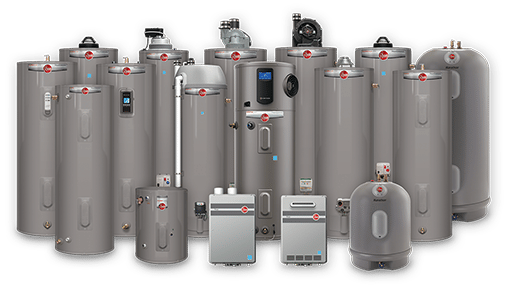
Water Heater Repair and Replacement: 5 Signs It’s Time
1. WATER HEATER IS COMING TO AN AGE OF FAILURE
At a certain point, as with any appliance, repairing a water heater will no longer be cost-effective. Likewise, even if an old water heater still works, modern units offer significant energy savings which could make a great investment for your home. The two most popular water heater options we offer are conventional tank water heaters and tankless water heaters. Our licensed plumbers are happy to advise and give recommendations for the best water heater repair and replacement.
2. RUSTY WATER, HEATER INLET VALVE, OR PIPES
Although steel is extremely strong, it has a weakness: RUST. When corrosion takes hold on a steel surface, it slowly spreads and eats through the steel in certain spots. On water pipes and tanks made of steel, rust serves as the warning sign for oncoming leaks.
The problem is that it’s often hard to tell whether the rust is coming from the water heater itself or from the pipes that lead to your faucet. In any case, rust is an immediate problem that needs to be rectified for the sanitation of your household.
RUSTY WATER
When rust appears in the hot water from the faucets in your sink and bathtub, chances are you have a rusty water heater. With water heaters that are used past their expiration date, rusting is inevitable. Rusting can occur in any water heater, even those that are only between eight and ten years old.
RUSTY VALVE/INLET
If you spot rust around the water inlet or pressure relief valve on the heater, it’s likely that rust has also taken hold inside the tank. If that’s the case, the only option is to replace the tank as soon as possible. There’s no way to salvage an aging water heater once rust enters the picture.
RUSTY PIPES
If tap water comes out rusty, it could also involve the pipes. If your piping system consists of galvanized pipes, rust could form on the insides with age. Sometimes this problem can get so intense that it becomes noticeable in sinks and tubs.
One way to determine whether the rust is originating from your pipes or from the water tank is to drain several buckets’ worth of hot water from the tank. If the water still comes out rusty by the third bucket load, it’s definitely a problem with the tank and not the pipes. This, of course, would mean that it’s time to replace the water heater. After all, water leaks could soon appear if the rust eats through the steel, resulting in water damage to your home.
3. RUMBLING NOISE FROM YOUR WATER HEATER
Another telltale sign of an ailing water heater is noise from the tank. As the heater ages, rumbling noises will start emanating louder and louder as the tank heats up the water. In households that consume large amounts of hot water, the problem is likely to be even more pronounced once the cause takes hold. Noise from a water heater is generally due to the following causes:
SEDIMENT BUILDUP
As an aging water heater is continually called upon to heat and reheat water, sediment starts to form on the bottom of the tank. Over time, the sediment hardens and grows thicker along the tank floor. Sediment can wear a water heater down rapidly and lead to the following problems:
- Accelerated Damage — the extra time that a tank spends heating water can cause the metal to turn brittle, which accelerates the likelihood of crack formation
- Inefficiency — water heaters with sediment buildup consume more energy due to the increased strain involved in heating water.
Noise caused by sediment buildup is often an indicator that the tank will eventually leak. However, the damage that sediment causes can be stopped with the following method:
FLUSHING THE WATER HEATER
Water heaters should be flushed on an annual basis. Doing so drains the sediment from the tank, which then allows it to work more efficiently. With a yearly tank flush, a water heater is likelier to last for its full life expectancy of roughly ten years. It’s best to have licensed plumbing professionals perform the flushing.
If a tank still makes noise once sediment has been flushed, there is probably a more serious problem with the water heater overall. In any case, healthy water heaters shouldn’t make noise. Those that creak or rumble despite periodic flushing is likely on the verge of a crack or leak and, therefore, should be replaced as soon as possible.
4. LEAKING WATER HEATER
As your water heater nears the end of its life expectancy, there is an increased chance that you will see water appear on the floor around the tank. When you see water, it generally means one thing: leaks. Depending on where you have the water heater located inside your house, a leak could result in significant damage. As such, a serious leak with your water heater can turn into a very dangerous problem in your home.
PRIMARY CAUSE OF LEAKS
Water leaks are often the result of expansions to the metal in the tank. These expansions occur over time as the inner body of the tank is exposed to thousands upon thousands of heating cycles. When a fracture first forms, the gap is likely to be slight enough to hold water in all but the most trying circumstances. Therefore, when the tank is idle, water won’t leak, but when the metal expands at the height of each heating cycle, small amounts of water are bound to leak through the gap.
ALTERNATE CAUSES
Water leaks aren’t always the result of expansions in the metal. In some cases where leaks have occurred, there may not be any problem with the tank itself. If water has appeared around the tank, check the following components of the water heater for signs of wetness:
- The temperature/pressure overflow pipe
- Fittings/connections to the tank
If leaking appears in either of those areas, there could be something wrong with the fittings, in which case you’ll need to have a plumber come and examine the issue. Check the connections and fittings to show no traces of leaks, the tank itself is most certainly at fault. You can rectify the former problem with tightening and adjustments, whereas tank leaks really have no remedy. Therefore, if water is leaking directly from the tank, it’s time to replace your water heater.
RISKS OF DELAYING REPLACEMENT
A leak in your water heater could be one of the most serious home maintenance issues that you’re likely to face throughout the span of occupancy at a given residence. If the heater is located within your house on the ground floor, a leak could unleash the following consequences:
- Soaked/ruined carpet, vinyl, tile, and wood floors.
- Saturated/destroyed personal belongings — card collections, albums, books, antiques, paintings, furniture, electronics, etc.
- Mold growth on floors, walls, carpeting, etc.
My Georgia Plumber has you covered, schedule online today if any of these apply to you.











